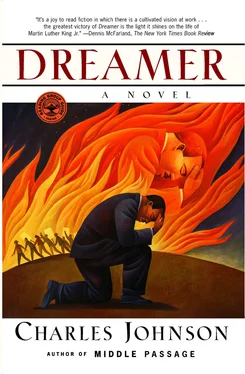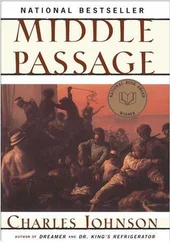Actually I couldn’t say; I’d never been shot down with such finesse before. Nor had I ever felt so impoverished by desire. Just then, her words were more than I could bear.
“We can still be friends?”
I couldn’t look at her, but I said, “Sure.” My eyes began to burn and steam, blurring the buckled, floral-print linoleum floor as she pushed up on her toes, pressing her lips against my cheek in a chaste kiss. “I suppose we should get back to unpacking, eh?”
“You go ahead, I’ll get Chaym.”
More than anything else, I needed to be away from the farmhouse. And her. It was dark now. My feet carried me east, from the kitchen to an open field. Looking back at the lighted rear window of the old, warm house with its family heirlooms and positivist history as it grew smaller, I felt better being outside, stepping through humus, round moss-covered stones green as kelp, past the well where the water tasted faintly of minerals, skinks, and salamanders. The brisk walk left me panting a little, perspiring as if a spigot somewhere in my pores had switched on, pouring out toxins in a tamasic flush of sweat that soaked my shirt. Yes, it still hurt. I’d always known I was hardly the model for Paul’s Epistle in Corinthians 13, but to be rebuffed because I fell so short of the minister’s example was confounding. Who could measure up to that ? Yet — and yet — in her refusal I also felt relief, as if the weight of want had lifted. I sat down in weeds high as my waist, the night closing round me like two cupped hands. Wondering less about the woman I’d desired than the mystery of my desire itself, how it had made me experience myself as lack and her as fulfillment, all of which were false, mere fictions of my imagination. Just beyond there were woods that looked vaporous and incorporeal in the moonlight; and I felt just as vaporous and incorporeal, as if maybe I might vanish in the enveloping, prehuman world around me. Leaves on the nearest trees trembled with tiny globes of moisture clear as glass. And then, as my eyes began to adjust, I saw numinal light haloing the head of a figure — it was Smith — kneeling amidst the trees.
His eyes were seeled, his breath flowed easily, lifting his chest at half-minute intervals and flaring the flanges of his nostrils faintly with each inhalation. His exterior was still as a figure frozen in ice. Yet inside, I knew from his notebooks, he was in motion, traversing 350 passages he’d memorized from numerous spiritual traditions, allowing the words to slip through his mind like pearls on a necklace. The passages — called gatha in Buddhist monasteries — ranged from Avaita Vedanta to Thomas à Kempis, from Seng Ts’an to the devotional poetry of Saint Teresa of Avila, from the Qur’an to Egyptian hymns, from a phrase in John 14:10 to the Dhammapada; they were tools — according to jottings he’d made — selected to free him from contingency and the conditioning of others. When he focused on a gatha, the gatha was his mind for that moment, identical with it, knower and known inseparable as water and wave. He was utterly unaware of me, and his practicing the Presence, reviewing these passages like a Muslim hafiz, was so private and intimate an exercise that I felt like a voyeur and was about to pull myself away, back toward the farmhouse, when I saw tears sliding down his cheekbones to his chin.
Then his eyes were open, and he asked softly, “You like what you see, Bishop?” He wiped his cheeks with the back of his hand. “Yeah, I cry sometimes. Can’t help myself. When I sit, it just comes out. I can’t keep it down. At the zendo, I wasn’t the only one who cried when doing zazen.”
I stepped closer and sat down as he stretched out his legs from the kneeling position, massaging them vigorously to get blood moving again. “Where was that?”
“Kyoto,” he said. “Two years after my discharge I was there, tossing down sake, and the fellah I was drinking with told me ’bout a Zen temple way out in the forest that accepted foreigners. ’Bout that time I was a mess, man. Drank like a fish. Hurt inside every damned day. I wanted to kill myself. Kept my service revolver right beside my pillow, just in case I worked up the courage to stick the barrel in my mouth and paint the wall behind me with brains. I went to the temple ’cause I was sick and tired of the world. I wanted a refuge, someplace where I could heal myself. I figured it was either the zendo or I was dead.” Smith kept on massaging his right leg as he talked, working his way methodically from his hip downward.
“When I got there, I kneeled in front of the entrance, on the steps, and kept my head bowed until I heard the straw sandals of one of the priests coming toward me. I begged him to let me train. Naturally, he refused my request, like he was supposed to do, and then he went away. That’s the script. So I sat there all day — like I was supposed to do — on my knees, my head bowed, keeping that posture and waiting. Night came, but I still didn’t move. On the second day it rained. I was soaked to the skin. I damned near caught pneumonia on the second evening. But sometime during the third day the priest came back and gave me permission to enter the temple temporarily. See, he was playing a role thousands of years old — same as I was playing mine. He had me wash my feet, gave me a pair of tatami sandals, put me in a special little room called tankaryo, shut the sliding paper door, and went away again, this time for five days. For five days, I didn’t see nobody. They didn’t bring me food. Or water. I waited, kneeling just like you seen me doing, my eyes shut, hands on my lap, palms up with my thumbs kissing my forefingers, meditating for a hundred twenty hours nonstop to prove to the priest that I could do it. I say five days, but when you’re in zazen that long, there is no time. That’s another illusion, Bishop. In God, or the Void — or whatever you wanna call it — past, present, and future are all rolled up in now . And the hardest thing a man can do, especially a colored man whose ass has been kicked in every corner of the world, is live completely in now . But I did. And the priest came back. He led me down a hallway with wooden floors polished so brightly by hand that they almost gleamed, then he stopped in front of a bulletin board listing the names of the monks and laymen presently training at the temple. Mine was the last, the newest one there. I tell you, buddy, when I seen that I broke down and cried like a goddamn baby. I was home. You get it? After centuries of slavery and segregation and being shat on by everybody on earth, I was home.”
I did get it, and in his voice I saw the beautiful vision of a tile-roofed, forest temple encircled by trees, the grounds spotless, the gardens well tended, and here and there were statues of guardian kings. Smith began slowly massaging his left leg as he’d done his right, working from hip to heel.
“I was a good novice, I want you to know that. Every day I was up at three-thirty A.M. when the priest struck the sounding board. When I washed up I didn’t waste a drop of water. I brushed my teeth using only one finger and a li’l bit of salt, and I was the first in the Hondo — the Buddha hall — for the morning recitation of sutras. After that, when we ate, I didn’t drop nary a grain of rice from my eating bowl. I shaved my head every five days. Kept my robes mended. With the others, I walked single file from the temple into town, reciting sutras and collecting donations in a cloth bag suspended from a strap around my neck. Always I blessed those who gave, singing a brief sutra that all sentient beings may achieve enlightenment and liberation. But for that year I trained, I never touched money. Or thought ’bout women. Or drink. The world that hurt me so bad didn’t exist no more, and I was happy. Hell, I wasn’t even aware of an I. After our rounds we came back and did samu —monastic labor. Chopping firewood. Maintaining the gardens. And all this we did in silence, Bishop. Each daily task was zazen . Was holy. No matter how humble the work, it was all spiritual practice.”
Читать дальше












